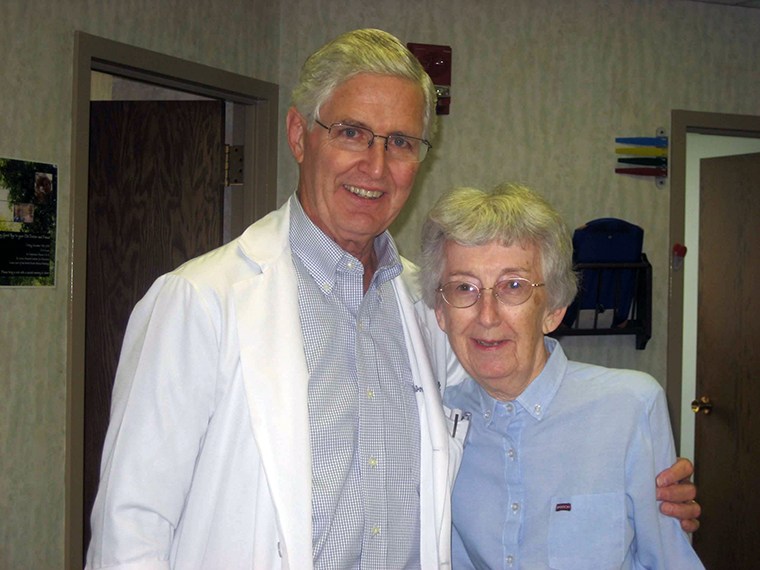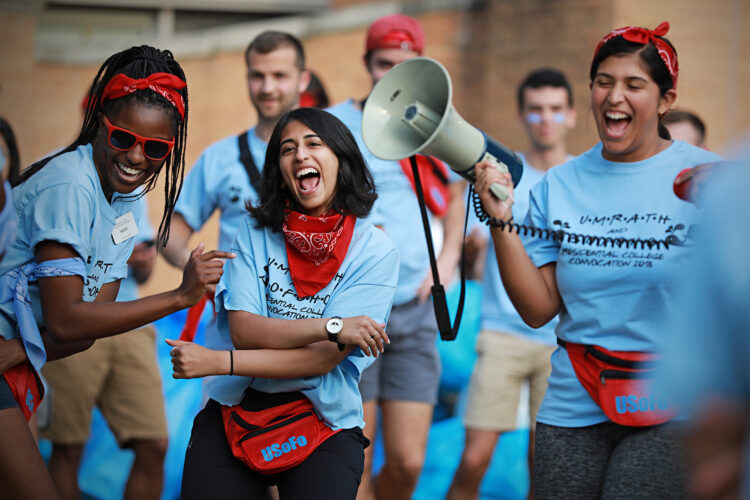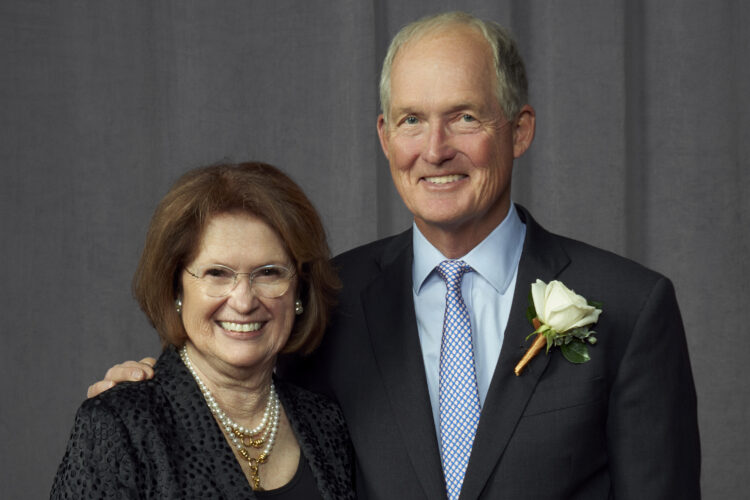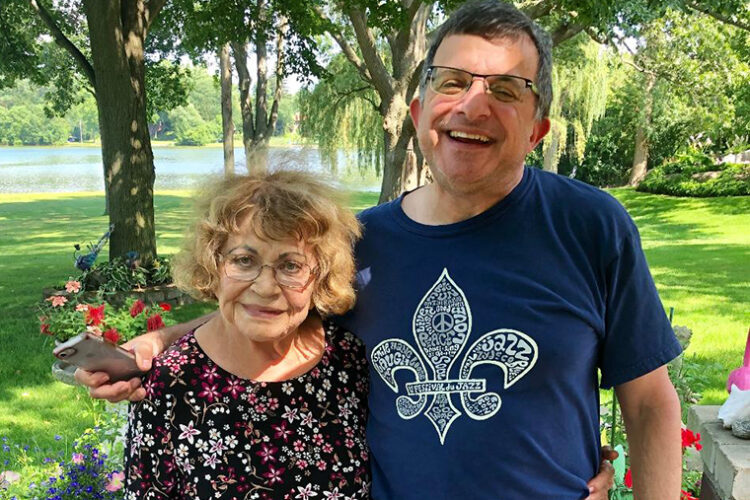“Tell me, what is it you plan to do with your one wild and precious life?”
This question ends the 1992 poem “The Summer Day” by acclaimed American author Mary Oliver. For Ruth Bebermeyer — the much-loved former director of alumni and constituent relations for Washington University School of Medicine — the answer was clear and easy. She lived life to its fullest and embodied the values of service and excellence in everything she undertook.
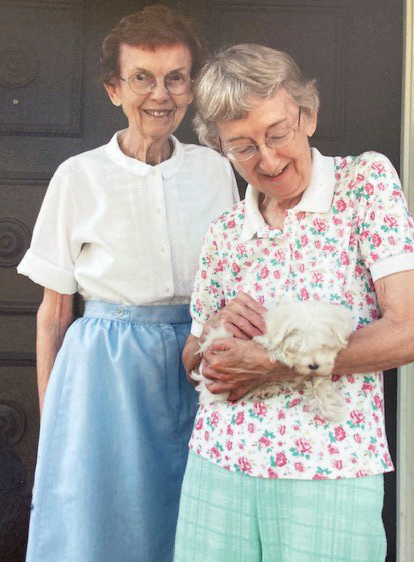
“If you saw Ruth, she was small, thin, and frail. You might look at her and take her for granted. But she was a powerhouse,” says Doug Twells, Bebermeyer’s former colleague who was the director and then assistant vice chancellor of medical development at WashU from 1991 to 2007. “Ruth was phenomenal at friend-raising,” he adds. “Alumni absolutely loved her because she was so meticulous in understanding their needs and exceeding their expectations.”
But Bebermeyer’s service as a staff member was just the beginning of her impact. She became a WashU philanthropist in her own right after the death of her older sister, Ruby Bebermeyer, from chronic obstructive pulmonary disease (COPD). A common lung condition with no known cure, COPD encompasses a group of diseases, including emphysema and chronic bronchitis, which block airflow and cause breathing problems, cough, and other symptoms.
Catalyzed by the need for further scientific inquiry into COPD, Ruth Bebermeyer established the Ruby Bebermeyer Endowed Fund for COPD Research at the School of Medicine in 2007 to advance the discovery and development of innovative therapies. Bebermeyer, who died in May 2022, further enhanced her support of this fund with a $1.3 million estate commitment.
Investing in cutting-edge research
Following her initial investment, Bebermeyer came to know leading COPD researcher Michael Holtzman, MD, the Selma and Herman Seldin Professor of Medicine and former director of the Division of Pulmonary and Critical Care Medicine at the medical school. Though her early financial contributions were relatively small, Bebermeyer’s faith in Holtzman’s research provided considerable motivation. “The main reason I got into this field was to help patients,” he explains. “When patients and their families come to you and believe in your approach and urge you to do something, it generates an incentive to work harder to overcome obstacles.”
One such obstacle is the relative lack of funding for COPD research, despite the condition’s prevalence. According to the Centers for Disease Control and Prevention (CDC), obstructive lung diseases like COPD and asthma are the third leading cause of death due to disease in the U.S., and more than 16 million Americans have COPD. The only available therapies focus on managing symptoms through supplemental oxygen and lifestyle modifications, such as smoking cessation, nutrition, and exercise.
Honoring a sisters’ bond
While COPD is a formidable public health challenge, Bebermeyer’s philanthropic impulse came from a deeply personal place: her bond with Ruby, her only sibling and an elementary school teacher for nearly 50 years. Born two years apart, the pair never married and spent almost every weekend together on their family farm in Warrenton, Missouri, where Ruth earned a reputation for being an indefatigable worker. They also traveled together, visiting Canada and other destinations across the U.S.
Watching her sister’s health decline from COPD in the early 2000s fueled Bebermeyer to take action. “Ruth was driven to address the limited treatment options for COPD patients,” says Lisa Portnoy, who worked with her as the assistant director of medical alumni and constituent relations and as director of stewardship for medical advancement. “She was determined to do everything she could to increase knowledge about the disease and help improve COPD patient care.”
“Ruth’s actions spoke louder than words. Her generosity and kindness helped improve relationships with alumni and faculty. One day, thanks in part to her, I hope to hear there is a cure for COPD.”
Lisa Portnoy, Ruth’s friend and former medical advancement colleague
Indeed, WashU researchers are rising to meet Bebermeyer’s call for more effective treatments. For example, Holtzman and collaborators are developing a drug that targets a distinct type of stem cell that drives lung disease by triggering processes like mucus production and inflammation.
“We have a drug candidate now, and we’re meeting with the Food and Drug Administration,” he says. “Once we get approval for use in humans, which I hope will be in one to two years, we can start testing it for safety.” If approved, the drug could also benefit patients with related post-viral lung and allergic diseases like asthma and COVID-19, Holtzman adds.
Remembering Ruth
Helping fund innovative research that holds promise for COPD patients is one part of Bebermeyer’s legacy. Her dedication as a WashU employee is another. “Ruth was a key cog in the machine of the alumni association,” recalls David Ortbals, MD ’70, who worked with her when he served as president of the Washington University Medical Center Alumni Association and was the sisters’ longtime physician.
Ortbals remembers Bebermeyer as an organized and creative leader. As an example, he cites “Docs Off Duty,” a popular reunion program she created for alumni to share their passions outside of medicine. Their presentations — covering disparate topics like mountain climbing, model trains, and singing in German — increased alumni engagement, he says. This type of creativity, combined with her ability to execute on a practical level, made Bebermeyer indispensable to both the medical advancement team and top university leaders.
Today, Bebermeyer’s extraordinary spirit lives on through the Ruth Bebermeyer Award, which is presented annually to a WashU medical student who shows compassion and sensitivity to the needs of others. And her example continues to inspire those who worked alongside her at the university.
“Ruth’s actions spoke louder than words,” Portnoy says. “Her generosity and kindness helped improve relationships with alumni and faculty. One day, thanks in part to her, I hope to hear there is a cure for COPD.”
